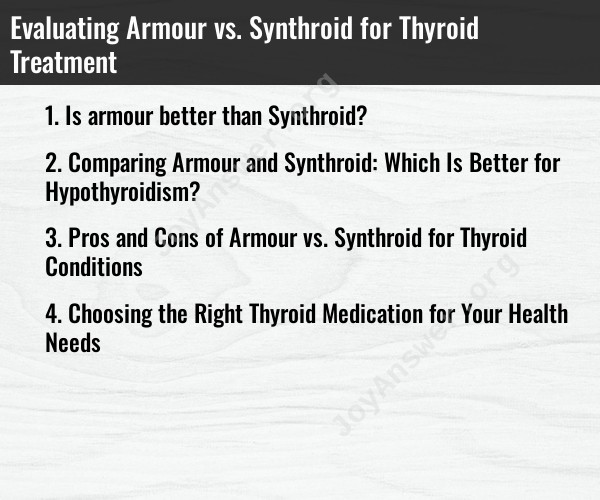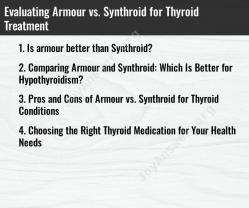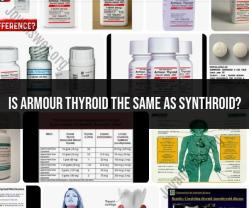Is armour better than Synthroid?
The choice between Armour Thyroid and Synthroid (levothyroxine) for thyroid treatment depends on various factors, including individual patient characteristics and preferences. Both medications are used to treat thyroid disorders, but they are not identical, and their effectiveness can vary from person to person. Here are some key points to consider when evaluating Armour Thyroid vs. Synthroid:
Active Ingredients:
- Synthroid (levothyroxine): This medication contains synthetic thyroxine (T4), which is identical to the hormone produced by the thyroid gland.
- Armour Thyroid: Armour Thyroid is a natural thyroid medication that contains a combination of both synthetic thyroxine (T4) and triiodothyronine (T3), which is another thyroid hormone.
Individual Response: Different individuals may respond differently to these medications. Some people may do well with Synthroid alone, while others may find that Armour Thyroid, with its combination of T4 and T3, is more effective for them. It often depends on the underlying thyroid condition and the individual's ability to convert T4 to T3.
Hypothyroidism Type: For individuals with primary hypothyroidism (where the thyroid gland itself is not functioning properly), either medication can be effective. However, some people may have a preference for one over the other based on their experience.
T4 to T3 Conversion: In some cases, individuals may have difficulty converting T4 (as found in Synthroid) to the active T3 hormone. In such cases, Armour Thyroid, which includes both T4 and T3, may be preferred.
Side Effects: Some people may experience side effects with one medication and not the other. Common side effects of thyroid medications can include jitteriness, palpitations, weight changes, and more. It's essential to discuss any side effects with your healthcare provider.
Consistency and Monitoring: The consistency of thyroid hormone levels in the blood is crucial for effective treatment. It's essential to work closely with a healthcare provider to monitor thyroid levels regularly and adjust the medication as needed.
Cost and Availability: Medication costs and availability can vary. In some cases, one medication may be more affordable or easier to obtain than the other.
Patient Preference: Some individuals have strong preferences for natural or synthetic thyroid medications based on personal beliefs or experiences.
Ultimately, the choice between Armour Thyroid and Synthroid should be made in consultation with a healthcare provider, ideally an endocrinologist or thyroid specialist. Your healthcare provider will consider your medical history, the specific characteristics of your thyroid condition, your response to medication, and your preferences when recommending the most suitable thyroid treatment for you.
It's important not to make this decision on your own or switch medications without consulting a healthcare professional, as making changes to thyroid medication can have significant effects on your health. Thyroid treatment is highly individual, and what works best for one person may not be the right choice for another.
Comparing Armour and Synthroid: Which Is Better for Hypothyroidism?
Armour and Synthroid are two of the most popular thyroid medications used to treat hypothyroidism. Both medications contain levothyroxine (T4), the synthetic form of the thyroid hormone thyroxine. However, Armour also contains triiodothyronine (T3), the active form of the thyroid hormone.
There is no definitive answer to the question of which medication is better for hypothyroidism, as the best medication will vary from person to person. Some people may do better on Armour, while others may do better on Synthroid. It is important to work with your doctor to determine which medication is right for you.
Pros and Cons of Armour vs. Synthroid for Thyroid Conditions
Here is a comparison of the pros and cons of Armour and Synthroid:
| Feature | Armour | Synthroid |
|---|---|---|
| Contains T3 | Yes | No |
| May be more effective for some people | Yes | No |
| May cause more side effects | Yes | No |
| More expensive | Yes | No |
Choosing the Right Thyroid Medication for Your Health Needs
When choosing a thyroid medication, it is important to consider your individual needs and preferences. You should also work with your doctor to determine the best medication for you.
Here are some factors to consider when choosing a thyroid medication:
- Your symptoms: If you are experiencing symptoms of hypothyroidism, such as fatigue, weight gain, and cold intolerance, Armour may be a good option for you. Armour may also be a good option if you have not had good results with Synthroid.
- Your overall health: If you have any other health conditions, such as heart disease or kidney disease, your doctor may recommend a specific thyroid medication for you.
- Your preferences: Some people prefer to take a medication that contains both T4 and T3, such as Armour. Others prefer to take a medication that contains only T4, such as Synthroid.
It is important to note that you should never switch thyroid medications without talking to your doctor first. Changing thyroid medications can cause serious side effects.
If you are unsure which thyroid medication is right for you, talk to your doctor. They can help you to weigh the pros and cons of each medication and to choose the best medication for your individual needs.





